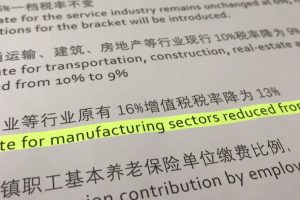This year started with China’s State Council chaired by Premier Li Keqiang announcing on January 8th support for the country’s main job creators, micro- and small-sized enterprises (MSEs), in the form tax cuts for both Value Added Tax (VAT) and Corporate Income Tax (CIT). The aim of the reform is to lessen the tax burden of Chinas micro- and small-sized businesses and promote long term developments in innovation, entrepreneurship and job creation. Amongst the announcements were the following changes (Caishui [2019] No.13, effective from Jan 01st, 2019 for three years):
- VAT exemption threshold for small-scale VAT taxpayers increases from RMB 30,000 to RMB 100,000 of monthly revenue.
- MSEs pay an effective CIT rate of 5% for taxable income less than RMB 1 million, and 10% for taxable income between RMB 1 – 3 million, much lower than the standard CIT rate of 25%.
*MSEs are defined as those businesses with less than RMB 3 million in annual taxable income (= Revenue – deductible costs), less than 300 employees and total assets worth less than RMB 50 million. In addition to the policies above, China’s State Council released preliminary policy updates on March 5th that it will be further reducing the VAT rates amongst preferential tax policies aimed at reducing the tax burden and support the long term development of Chinese businesses. Changes announced include;
- VAT rate for manufacturing sectors reduced from 16% to 13%
- VAT rate for transportation, construction, real-estate and other industries reduced from 10% to 9%
- VAT rate for services remain unchanged at 6%. However, more deductions for the bracket will be introduced.
- Mandatory pension contribution by employers reduced to 16%
As opposed to announcements made on January 8th which focused on China’s micro- and small-sized businesses, the preliminary policy updates from China’s State Council on March 5th are anticipated by all businesses. However, there are two sides to every coin. Despite providing significant tax relief to businesses in 2018, worth an estimated RMB 1.3 trillion, total tax income still grew by 8.3% (RMB 1.2 trillion) outpacing GDP growth. Much of the recent good news for Chinese MSEs is widely believed to be foreshadowing more stringent enforcement of tax and compliance regulations in the coming years.
Strengthening tax administration
China is transitioning from being a fapiao driven tax system (以票控税) to an information driven tax system (信息管税). This information driven tax system relies on big data gathered from multiple administrative authorities to identify inaccurate financial reports and tax shortages. The current agenda supporting Chinas micro- and small-sized businesses is largely to prepare for stronger enforcement of tax compliance and other areas such as social security, which is thought to be underpaid by roughly RMB 700 billion annually, according to 51 Social Security (51社保). The China State Council is allowing its current tax reform agenda to strengthen its micro- and small-sized business sector to the point where they can sustain themselves when they will be required to comply with the full scope of applicable laws.
Monitoring Personal Bank Account
The focus of much of China tax reform is the use of personal bank accounts – including WeChat and Alipay – to receive business revenue. This practice allows those involved to maintain two sets of accounting books; one set of “external” books for tax filing and compliance and one set of “internal” books to assess the business performance. The central bank of China upped the ante for these businesses when they announced they will no longer be exercising control over the opening of new bank accounts and instead strengthening the monitoring of both company and personal transactions. Transactions that exceed predetermined amounts and frequency are flagged and reported to the central bank of China on the second working day and the selected accounts will be passed to tax authorities or other relevant authorities for further investigations (Yinfa [2019] No. 41, effective from 25th Feb 2019).
New Accountability Measures
Another new policy concerning the Information Disclosure of Major Taxes and Untrustworthy Cases (Announcement of SAT [2018] No. 54, effective from 01st Jan 2019) shows China’s government’s concentrated effort to build an accountability system for developing a healthy and fair business environment. Tax evasion and dishonest behaviors will result in the company’s credit level downgrading to class “D”. The company will not only face many difficulties in their business operations but also affect the owner and responsible accountant’s personal life. In addition, details of the illegal behavior and their personal information will be made public on various government-run media for three years. Thus, proper financial management and being in compliance have become very important for the business owner and also accountants. With more stringent oversight, it’s also increasingly common that poor-quality accounting practices result in financial penalties due to non-compliance. In light of recent changes in China’s tax regulations, business owners are advised to review their compliance status and correct any issues sooner rather than later. For those businesses who already comply with applicable regulation and pay their taxes, the Chinese State Council has promised support for your business to prosper under the current tax reform agenda. However, those businesses who continue to attempt to cheat the tax authorities, are likely to face prosecution under Chinas information driven tax system.





